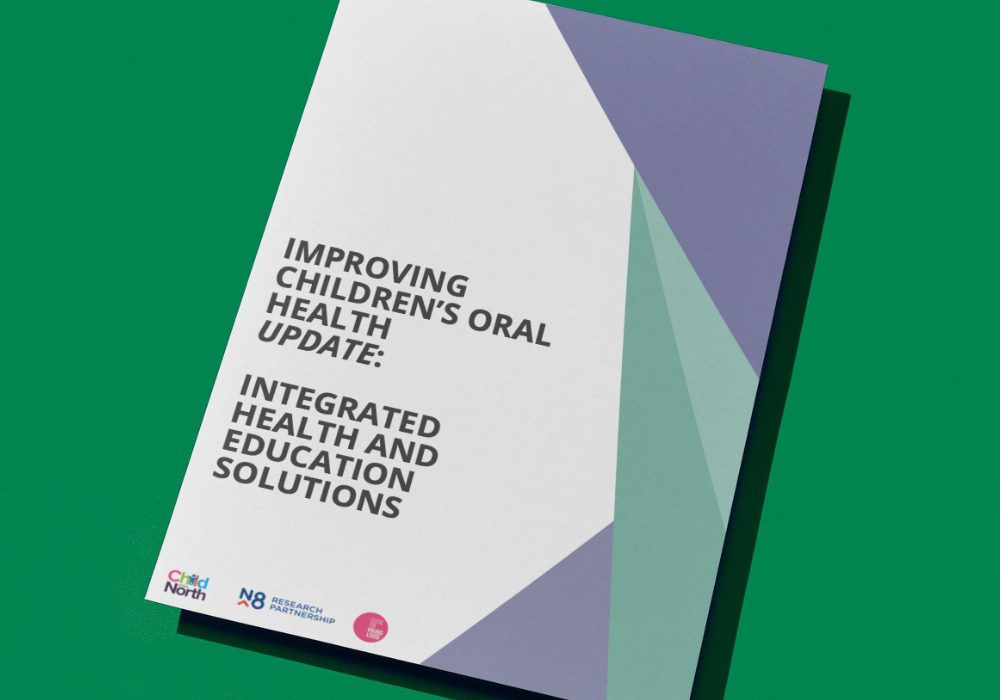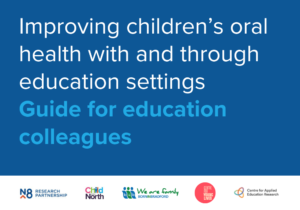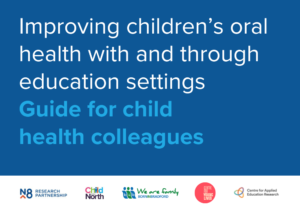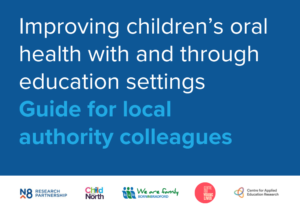Improving children’s oral health with and through educational settings
For a country that works for all children and young people
We are calling on the government to put children first. Our 2024 report series provides evidence-based plans and recommendations on how to improve outcomes for children and young people in the North of England and beyond. Published alongside 2025 report updates, new practitioner toolkits have been designed to support schools, child health services, and local authorities to implement the report recommendations and put children first. #ChildrenFirst
Produced jointly by Child of the North and the Centre for Young Lives, the eighth report in the Child of the North 2024/25 campaign series makes a series of proposals to tackle the children’s oral health crisis in England which is seeing millions of children suffering from tooth decay.
First published in September 2024, An evidence-based plan for improving children’s oral health with and through educational settings, calls on the new Government to develop a national child oral health strategy and makes recommendations to reduce sugar consumption among children, optimise fluoride exposure, and increase access to dental care. It urges Ministers to be radical and use sugar taxes, energy drink bans, targeted supervised tooth-brushing in nurseries and schools, and an expansion of fluoridation.
An update, Improving children’s oral health update: Integrated health and education solutions, released in October 2025, forms part of the #ChildrenFirst campaign, drawing attention back to the issues highlighted in the series, and providing a series of toolkits designed to support schools, child health services and local authorities to implement the report recommendations and improve outcomes for all children.
We need the government, policymakers, practitioners, academics, communities and young people to work together to build a country that works for all children and young people.
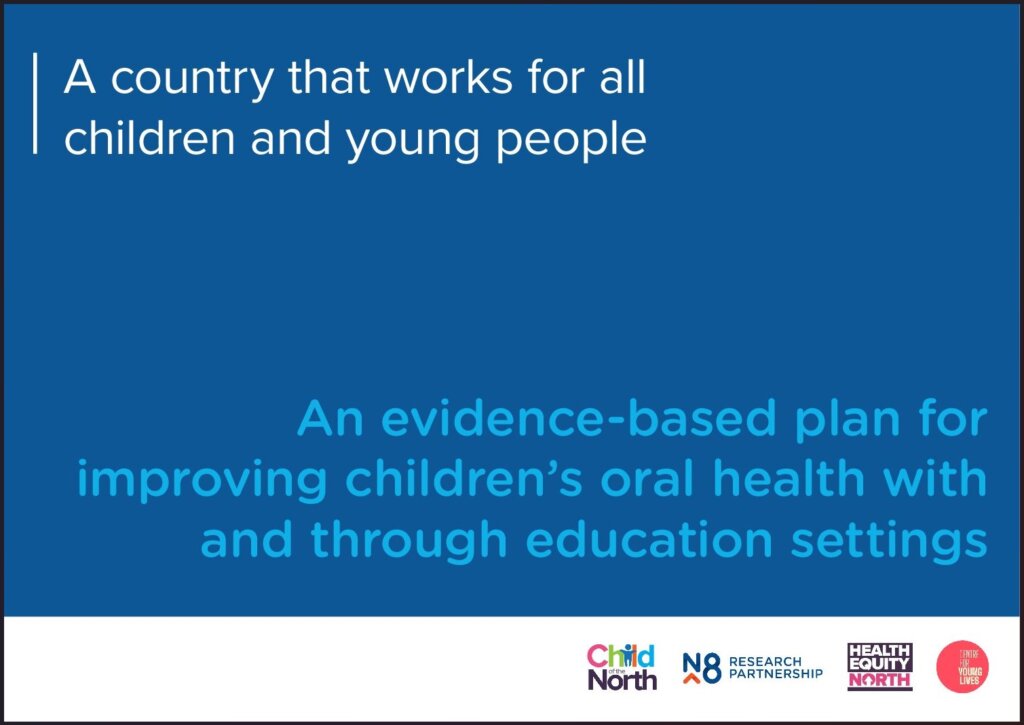 |
An evidence-based plan for improving children’s oral health with and through educational settingsPublished September 2024, as the as the eighth report in our twelve-part series Our analysis reveals that:
|
How To Guides
A series of toolkits have been developed to help practitioners and organisations take practical steps to improve the health and wellbeing of the children and young people with whom they work directly. Building on the findings of the Child of the North reports, these ‘How To’ guides provide evidence and suggestions about how all parties can work together.
Webinar
In October 2024 report authors Prof Zoe Marshman and Prof Peter Day held a webinar exploring the report’s findings, policy recommendations and interventions and toolkits which have been tested in practice.
Anne Longfield, Executive Chair of the Centre for Young Lives, said:
“It is staggering that so many children, particularly in the North of England and those living in low income families, are now growing up with tooth decay and suffering from toothache and discomfort. This can affect their quality of life, sleep patterns, eating habits, and impact on school readiness and attendance, speech and language development, and overall confidence. In some areas it has sadly become the norm.
“Many children are not only missing out on NHS dental healthcare but are more likely to suffer tooth decay from a younger age.
“The Government’s proposals for a programme of supervised teeth-brushing in schools is a positive step forward, as is its overall focus on boosting children’s wellbeing.
“We urge Ministers to be radical, go much further, and ignore any accusations of a ‘nanny state’. We need to take evidence-based action and to develop a national plan to tackle a rotten teeth crisis affecting millions of our children.”
Paula Waterhouse, President of the British Society of Paediatric Dentistry, said:
“This report reveals how higher levels of deprivation and associated unmet dental need are more seriously impacting children and young people living in the North of England compared with their southern counterparts.
“It is time to establish an oral health strategy for children and young people across England. The evidence base garnered by existing oral health research should be used to inform Government strategy and implementation of both national and local policies.
“We need to act now. Our children’s health depends on it and it’s everybody’s business – parents, dental and medical teams, health visitors, industry, education colleagues, and policy makers. We all have a part to play.”
Professor Mark Mon-Williams, Child of The North report series editor, said:
“Toothache is caused primarily by decay and the rotten teeth of the next generation provide a stark reminder of the perilous state of the nation’s health.
“The pain of toothache is excruciating and the most brilliant teacher in the world will struggle to educate a child experiencing dental disease.
“The time has come for the UK to start taking its future seriously – and helping ensure that all children throughout the UK have a smile on their face seems a pretty good place to start.”
Dr Camilla Kingdon, Immediate Past President of the Royal College of Paediatrics and Child Health, said:
“I am really thrilled with this report because the state of our children’s teeth should be a source of national embarrassment.
“This shows that there is so much that can be done to tackle the problem. The many spin offs of a robust national strategy to improve children’s oral health would be potentially significant – benefits for tackling obesity as well as mental health issues, and potentially improving school attendance, amongst other things.
“The impact of poor oral health stretches way beyond childhood and so every one of us should see this as a key health promotion and disease prevention strategy that benefits the whole nation.”
Report co-author Zoe Marshman, Professor of Dental Public Health at the University of Sheffield, said:
“Treatment for tooth decay is the most common reason why young children – over 33,000 youngsters each year – are admitted to hospital, costing the NHS over £50 million every year.
“In deprived areas of the country up to 50 per cent of five-year-olds have tooth decay which causes pain and suffering, as well as affecting what children eat, their speech, sleep, quality of life and attendance at school.
“This report brings to shine a spotlight on the impact of poor dental health on children’s lives and to recommend a new national strategy to focus attention on providing much needed solutions.”
Report co-author Peter Day, Professor of Paediatric Dentistry, University of Leeds and Community Dental Service, Bradford District Care NHS Foundation Trust said:
“I welcome the opportunity to write this report with colleagues across the North of England and shine a light on children’s oral health. As a paediatric dentist, I see the impact of tooth decay on children every day in my clinic. There is still much to do. This report lays out strong evidence for what works. We need to reorient and coordinate national and local public services towards prevention and ‘turn the taps off.’ All children deserve the best start in life, and this includes having a healthy set of teeth.”
Sign up for updates on our 2024/25 Campaign
We will only use this data for the purposes of providing updates on the Child of the North 2024/25 campaign and report series. For more information see the Privacy Policy at https://www.sheffield.ac.uk/privacy
Previous Reports
Previous reports can be found archived on our Child of the North Reports page.
Contact Us
Stephen Parkinson, Research Partnership Manager
***




